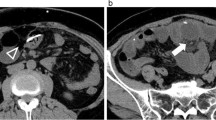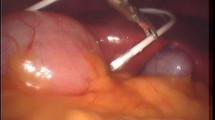Abstract
Background
The traditional management of hydrocephalus still is the placement of ventriculoperitoneal (VP) shunts. However, the majority of patients require one or more revisions over their lifetime. Revisions may be required for infections, proximal site malfunction, or distal catheter complications. The authors present their experience with distal catheter complications managed laparoscopically.
Methods
Patients with recurrent symptoms of increased intracranial pressure or abdominal complaints were evaluated for shunt malfunction. Similar radiographic imaging was performed for all the patients, including computed tomography (CT) of the head and abdomen, shunt series, and/or ultrasound of the distal catheter.
Results
From April 2003 to July 2005, 13 patients with distal VP shunt complications were managed laparoscopically. On the basis of preoperative cerebrospinal fluid (CSF) cultures, all the patients were determined not to have an infection. Radiographic imaging showed the patients to have distal catheter problems. Preoperatively, five abdominal CT scans, six shunt series, and four abdominal ultrasounds were obtained. All studies singly and positively identified the appropriate abdominal catheter defect except in three patients who required multiple sequential radiographic studies for final determination of the diagnosis. In four patients (30.8%), the distal catheter was found to be in the extraperitoneal space. Another four patients (30.8%) had intraabdominal CSF pseudocysts. Five patients (38.4%) had issues with the position of the intraabdominal catheter: four of them subdiaphragmatic and one on the dome of the bladder. Laparoscopic repositioning was successful for all 13 patients.
Conclusion
Regardless of the patient’s presenting symptoms, appropriate imaging studies should be obtained preoperatively in a sequential manner. Distal VP shunt complications can be safely and effectively managed laparoscopically. This approach allows the intraabdominal portion of the catheter to be assessed and problems to be managed, thereby salvaging the existing shunt and avoiding the potential morbidity associated with additional VP shunt placement.




Similar content being viewed by others
References
Rizvi R, Anjum Q (2005) Hydrocephalus in children. J Pak Med Assoc 55:502–507
Vinchon M, Fichten A, Delestret I, Dhellemmes P (2003) Shunt revision for asymptomatic failure: Surgical and clinical results. Neurosurgery 52:347–353 discussion 353–356
Caldarelli M, Di Rocco C, La Marca F (1996) Shunt complications in the first postoperative year in children with meningomyelocele. Childs Nerv Syst 12:748–754
Blount JP, Campbell JA, Haines SJ (1993) Complications in ventricular cerebrospinal fluid shunting. Neurosurg Clin North Am 4:633–656
Cochrane DD, Kestle JR (2003) The influence of surgical operative experience on the duration of first ventriculoperitoneal shunt function and infection. Pediatr Neurosurg 38:295–301
Kestle J, Drake J, Milner R, Sainle-Rose, Cinalli G, Boop F, Piatt J, Haines S, Schiff S, Cochrane D, Steinbok P, MacNeil N (2000) Long-term follow-up data from the Shunt Design Trial. Pediatr Neurosurg 33:230–236
Esposito C, Porreca A, Gangemi M, et al. (1998) The use of laparoscopy in the diagnosis and treatment of abdominal complications of ventriculoperitoneal shunts in children. Pediatr Surg Int 13:352–354
Lortat-Jacob S, Pierre-Kahn A, Renier D, et al. (1984) Abdominal complications of ventriculoperitoneal shunts in children: 65 cases. Chir Pediatr 25:17–21
Acharya R, Ramachandran CS, Singh S (2001) Laparoscopic management of abdominal complications in ventriculoperitoneal shunt surgery. J Laparoendosc Adv Surg Tech A 11:167–170
Pernas JC, Catala J (2004) Case 72: Pseudocyst around ventriculoperitoneal shunt. Radiology 232:239–243
Deinsberger W, Langhans M, Winking M, Boker DK (1995) Retrieval of a disconnected ventriculoperitoneal shunt catheter by laparoscopy in a newborn child: Case report. Minim Invasive Neurosurg 38:123–124
Samdani AF, Storm PB, Kuchner EB, et al. (2005) Ventriculoperitoneal shunt malfunction presenting with pleuritic chest pain. Pediatr Emerg Care 21:261–263
Naradzay JF, Browne BJ, Rolnick MA, Doherty RJ (1999) Cerebral ventricular shunts. J Emerg Med 17:311–322
Paddon AJ, Horton D (2000) Knotting of distal ventriculoperitoneal shunt tubing. Clin Radiol 55:1–3
Kusano T, Miyazato H, Shimoji H, et al. (1998) Revision of ventriculoperitoneal shunt under laparoscopic guidance in patients with hydrocephalus. Surg Laparosc Endosc 8:474–476
Turner R, Chahlavi A, Rasmussen P, Brody F (2004) Laparoscopic revision of a ventriculoperitoneal shunt. J Laparoendosc Adv Surg Tech A 14:310–312
Oh A, Wildbrett P, Golub R, et al. (2001) Laparoscopic repositioning of a ventriculoperitoneal catheter tip for a sterile abdominal cerebrospinal fluid (CSF) pseudocyst. Surg Endosc 15:518
Goeser CD, McLeary MS, Young LW (1998) Diagnostic imaging of ventriculoperitoneal shunt malfunctions and complications. Radiographics 18:635–651
Bartynski WS, Valliappan S, Uselman JH, Spearman MP (2000) The adult radiographic shuntogram. AJNR Am J Neuroradiol 21:721–726
Drake JM, Martin AJ, Henkleman RM (1991) Determination of cerebrospinal fluid shunt obstruction with magnetic resonance phase imaging. J Neurosurg 75:535–540
Seppanen U, Serlo W, Saukkonen AL (1987) Valvography in the assessment of hydrocephalus shunt function in children. Neuroradiology 29:53–57
Salomao JF, Leibinger RD (1999) Abdominal pseudocysts complicating CSF shunting in infants and children: Report of 18 cases. Pediatr Neurosurg 31:274–278
Khaitan L, Brennan EJ Jr (1999) A laparoscopic approach to ventriculoperitoneal shunt placement in adults. Surg Endosc 13:1007–1009
Khosrovi H, Kaufman HH, Hrabovsky E, et al. (1998) Laparoscopic-assisted distal ventriculoperitoneal shunt placement. Surg Neurol 49:127–34 discussion 134–135
Chopra I, Gnanalingham K, Pal D, Peterson D (2004) A knot in the catheter: An unusual cause of ventriculoperitoneal shunt blockage. Acta Neurochir (Wien) 146:1055–1056 discussion 1056–1057
Naim Ur R, Jamjoom A, Jamjoom ZA (1996) Intestinal obstruction caused by extraperitoneal cerebrospinal fluid collection. Pediatr Neurosurg 25:160–162 discussion 163
Fewel ME, Garton HJ (2004) Migration of distal ventriculoperitoneal shunt catheter into the heart: Case report and review of the literature. J Neurosurg 100(2 Suppl Pediatrics):206–211
Hirano Y, Sasajima H, Mineura K, et al. (1997) Laparoscopic retrieval of a dislocated ventriculoperitoneal shunt catheter: Report of three cases and a review of the literature. No Shinkei Geka 25:629–633
Author information
Authors and Affiliations
Corresponding author
Rights and permissions
About this article
Cite this article
Nfonsam, V., Chand, B., Rosenblatt, S. et al. Laparoscopic management of distal ventriculoperitoneal shunt complications. Surg Endosc 22, 1866–1870 (2008). https://doi.org/10.1007/s00464-007-9728-4
Received:
Revised:
Accepted:
Published:
Issue Date:
DOI: https://doi.org/10.1007/s00464-007-9728-4




